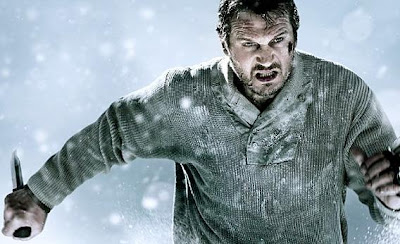 Although the motion picture, The Grey, wasn't the "Liam Neeson-takes-names" action flick I thought it would be…it was still quite entertaining. I'll never forget how well the actors portrayed the urgency of starting fires in the wolf-infested woods of Alaska. Without an arsenal of weapons or safe shelter, a strong fire was the only hope the characters had of staving off the hungry, flesh-eating predators.
Although the motion picture, The Grey, wasn't the "Liam Neeson-takes-names" action flick I thought it would be…it was still quite entertaining. I'll never forget how well the actors portrayed the urgency of starting fires in the wolf-infested woods of Alaska. Without an arsenal of weapons or safe shelter, a strong fire was the only hope the characters had of staving off the hungry, flesh-eating predators.
As C.S. Lewis once stated, our only hope in "shoving back" the animal-like rush of our hopes, anxieties and expectations each day…is prayer. Not a simple "bless this food and all the people in the world" type of prayer. Not a "all about me" prayer either. Yet, the prayer where honesty and intentionality collide is where we commune with God and find hope.
When Paul wrote Timothy, he helped the young pastor in Ephesus understand the significance of prayer. He reminds his protege to present "petitions, prayers, intercessions and thanksgivings" before God. In essence, Paul is saying to "bring it all" before the Creator. He is big enough to handle it all. Petitions go beyond our personal needs. If our hearts are fixed on the gospel, we understand that the lost around us have the "great need of salvation." Intercession literally means "to fall in with someone" and "to draw near so as to speak intimately." In other words, our prayers for the lost and unreached should produce a compassion that "understands the depth of their pain and misery." We also focus on the "thanksgivings" of our lives…even in the midst of depression, tragedy and death.
This type of prayer constructs within us two primary fruits.
First, the more attention we divert away from our world and to the great needs of the lost, impoverished and suffering…the more we see that our role is one of many on a grand stage. The Story of Redemption is the most beautiful of history and God wants us to see it and understand our role in giving Him glory. When we take the focus solely off of our needs, He is most glorified and we are most satisfied, as Piper would say.
 Second, we experience the amazing privilege that Christ purchased with his blood. Paul said we have this honor to boldly approach the Lord because "we have one mediator between God and man, the man Christ Jesus, who gave Himself as a ransom for us all." This earth-shattering truth challenges me not to waste the blood of Christ completely on my needs, but to move towards a gospel-centered prayer life.
Second, we experience the amazing privilege that Christ purchased with his blood. Paul said we have this honor to boldly approach the Lord because "we have one mediator between God and man, the man Christ Jesus, who gave Himself as a ransom for us all." This earth-shattering truth challenges me not to waste the blood of Christ completely on my needs, but to move towards a gospel-centered prayer life.
So today, with all of my wild "wolves" of desire, self-absorption, and narcism, I'm fighting off the wolves by setting ablaze the fire of prayer. A fire built on the fuel of "me" will die down all too soon. Yet a fire built on Christ-focused prayer will keep away the hungry predators.

